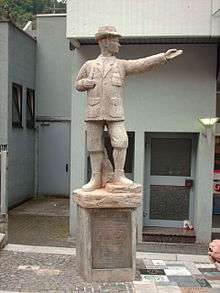Richard Schirrmann

Richard Schirrmann (15 May 1874 – 14 December 1961) was a German teacher and founder of the first youth hostel.
Born in Grunenfeld (today Gronówko), Province of Prussia as the son of a teacher, Schirrmann studied to become a teacher himself. In 1895, he received his qualification, and was sent to Altena, Westphalia in 1903. In 1907, he first published his idea of an inexpensive accommodation for young people, after he noticed the lack of such places on a school trip when he had to spend the night in barns or village school buildings. Schirrmann received considerable support and donations, and in 1912 he opened the first youth hostel in the recently reconstructed Altena castle.
Schirrmann described a Western Front Christmas Truce in December 1915:
"When the Christmas bells sounded in the villages of the Vosges behind the lines .. something fantastically unmilitary occurred. German and French troops spontaneously made peace and ceased hostilities; they visited each other through disused trench tunnels, and exchanged wine, cognac and cigarettes for Westphalian black bread, biscuits and ham. This suited them so well that they remained good friends even after Christmas was over.
Schirrmann served in a regiment holding a position on the Bernhardstein, one of the mountains of the Vosges - separated from the French troops by a narrow no-man’s-land, which his account describes as "strewn with shattered trees, the ground ploughed up by shellfire, a wilderness of earth, tree-roots and tattered uniforms". Military discipline was soon restored, but Schirrmann pondered over the incident, wondering whether "thoughtful young people of all countries could be provided with suitable meeting places where they could get to know each other".
German Youth Hostel Association
In 1919, he founded a nationwide youth hostel association, and in 1922, he retired from teaching to focus entirely on the youth-hostel movement. From 1933 to 1936, he also served as President of the International Youth Hostelling Association (now Hostelling International), before the Nazi government forced him to resign. After the Second World War, he worked on the rebuilding of the German association, for which he received the Bundesverdienstkreuz in 1952.
Schirrmann died in Grävenwiesbach (Taunus) in 1961.
See also
References
- Richard Schirrman: The first youth hosteller: A biographical sketch by Graham Heath (1962, International Youth Hostel Association, Copenhagen, in English).
|